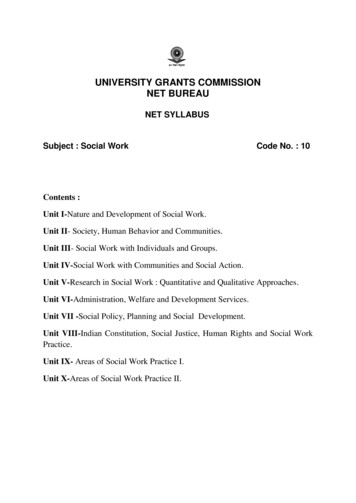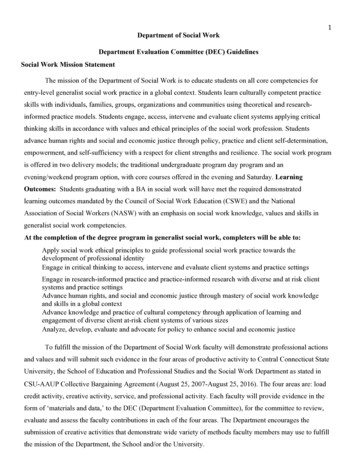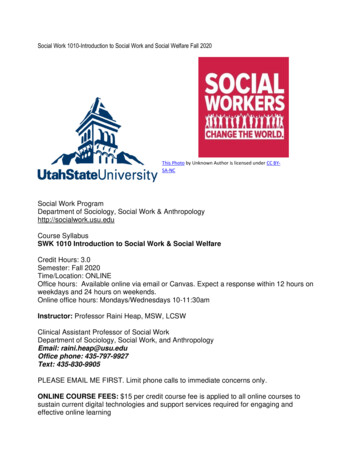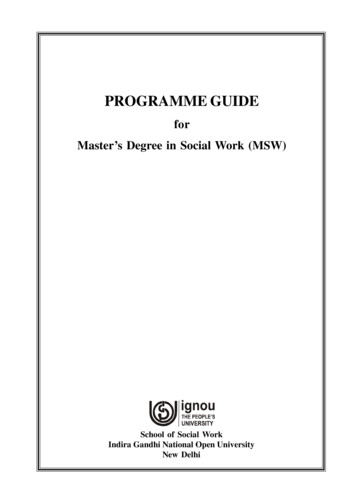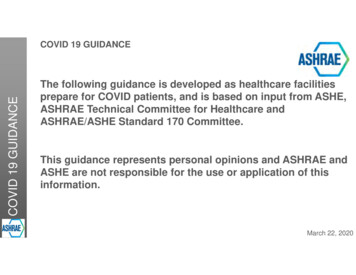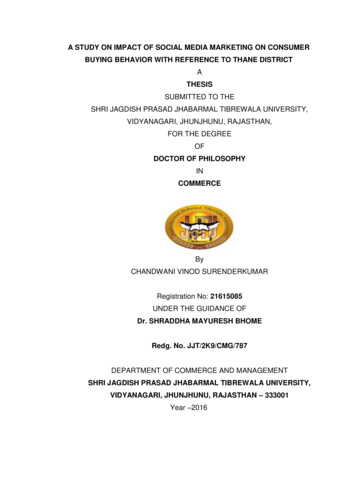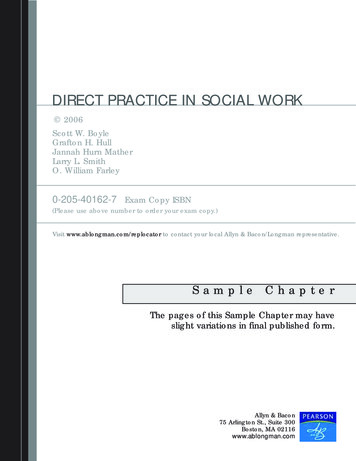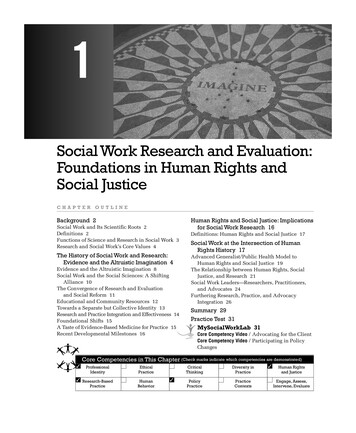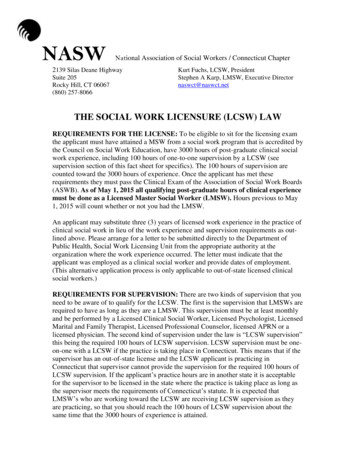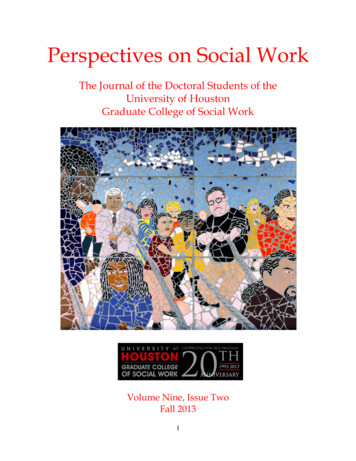
Transcription
Perspectives on Social WorkThe Journal of the Doctoral Students of theUniversity of HoustonGraduate College of Social WorkVolume Nine, Issue TwoFall 20131
Perspectives on Social WorkEditor-in-ChiefChristine R. Bakos-BlockGraduate College of Social WorkEditorial BoardTraber GiardinaAnny MaJacquelynn DuronYi RenFredreka LivingstonMelissa I. M. TorresMicki WashburnMark TrahanOutside ReviewersStephanie Begun, School of Social Work,University of DenverMatthew Diner, Wurzweiler School of SocialWork, Yeshiva UniversityKelly Nye-Lengerman, School of Social Work,University of MinnesotaShanondora Billiot, Brown School of SocialWork, Washington UniversityNick Doukas, Faculty of Social Work,University of TorontoAllison O’Connor, College of Social Work,University of UtahShamra M. Boel Studt, School of Social Work,University of IowaStephanie Felder, National Catholic School ofSocial Service, Catholic University of AmericaChristopher Rocchio, Myron B. ThompsonSchool of Social Work, University of HawaiiErin Boyce, School of Social Work, Universityof DenverBrandi Felderhoff, School of Social Work,University of Texas at ArlingtonJenn Root, Faculty of Social Work, Universityof TorontoSamantha Brown, School of Social Work,University of DenverKellie Gergely, College of Social Work,University of TennesseeAbigail Ross, School of Graduate Studies,Boston UniversityErica Caton, Kent School of Social Work,University of LouisvilleW. Gigi Goary, Faculty of Social Work,University of TorontoSarah Serbinski, Faculty of Social Work,University of TorontoJessica Camp, School of Social Work, WayneState UniversityChristie Hunnicutt, School for Social Work,Smith CollegeBrittany Schuler, School of Social Work,University of MarylandDerek Chechak, School of Social Work,Memorial University of NewfoundlandStacy Kratz, School of Social Work, Universityof South FloridaLynn Squicciarini, College of Social Work,University of KentuckySaras Chung, Brown School of Social Work,Washington UniversityLarisa Leader, School of Social Work, WayneState UniversityHyun A. Song, School of Social Work,University of PittsburghKaren Cinnamond, College of Social Work,University of KentuckyJennifer Martin, School of Social Work,University of DenverChristina Tam, Luskin School of Public Affairs,University of California at Los AngelesMichael Clarkson-Hendrix, School of SocialWelfare, State University of New YorkChristina Marsack, School of Social Work,Wayne State UniversityBecky Thomas, Mandel School of AppliedSocial Sciences, Case Western ReserveUniversityJessica Costeines, Graduate School of SocialService, Fordham UniversitySunny Mathew, Graduate School of SocialService, Fordham UniversityDwight E. Thompson, School of Social Work,Memorial University of NewfoundlandMatthew Vasquez, School of Social Work,University of IowaShantel West, School of Social Work, WayneState UniversityFaculty SponsorSheara Williams2
From the Editor.4Perspectives on Social Work EducationA Fish Out of Water: A Seasoned Professor from a Small Private University .5Discusses her First Experience as a Teaching Assistant at a Large State UniversityChristine Fulmer, University of KentuckyA Perspective on the Historical Epistemology of Social Work Education .9M. Gail Augustine and Carolyn Gentle-Genitty, Indiana UniversityConceptualizing Ethics Education under the Joint JD/MSW Degree Program .21Ifem E. Orji, City University of New YorkPerspectives on the Social Work ProfessionIn Critical Demand or Crisis: The Identity of the Social Work Profession .31Kathy Hogarth, Ph.D. and Rachelle Ashcroft, Ph.D., School of Social Work, Renison UniversityCollege, University of WaterlooWill History Repeat Itself? An Overview of the Development of Knowledge.43for the Professional Social WorkerMargaret H. Lloyd, The University of Kansas School of Social WelfareQualitative ReviewReality TV Therapy: Implications for Mental Health Stigma and .50Service Utilization among African-American AdolescentsZuleka Henderson, Howard UniversityCommunity Based Participatory Research and Youth Tobacco Control: .58A Qualitative Interpretive Meta-SynthesisPamela Hancock Bowers,MSW, University of Texas at Arlington, School of Social WorkCV Builder. . 72Guidelines for Submission to PSW .773
From the EditorWe are pleased to present the Fall 2013 Issue of Perspectives on Social Work. Thisedition is significant to us as this semester marks not only the 20th anniversary for our Ph.D.program, but the 10th anniversary of our journal. It has been a great experience acting as Editorin-Chief for the 2013 Fall edition of PSW. Acting as editor-in-chief for the journal has been anamazing experience and has supplemented my doctoral education in ways I could not haveanticipated. Furthermore, our 10th anniversary sees our journal growing in exciting ways. Wereceived a record number of submissions this year, and as our journal has grown, so has theresponsibilities. I’d like to share with you some of my experiences as both a doctoral student andan editor.You may or may not have heard the phrase, “you only get out what you put in.” Thiscommon advice given when one is entering graduate school and many of you may have heardthis without giving it a second thought. As doctoral students, our schedules beyond filled. Wehave classes, internships, teaching, just to name a few. We do not, however, learn everything weneed to learn on campus, or in classrooms. We accepted the challenge of a doctoral education,but our classes and internships cannot complete our education. We need to go beyond ourclassrooms and challenge ourselves to do more. Although we could stick to our set schedules, wewill be doing so much more as academics and it is completely up to us to seek out opportunitiesto enhance our learning and growth. Working as reviewers not only builds our CVs, but alsohelps fill in the gaps in our learning, by developing our own writing, and preparing us for workwe will be doing outside of our institutions.Finally, as our journal has grown rapidly over the past few years, we have depended moreon outside reviewers. Collaboration, whether between individuals or organizations, is animportant part of our education and it is essential for our success as students, as academics and asprofessionals. Moreover, the collaboration we have formed with our reviewers is essential to oursuccess and continued growth. We extend our deepest gratitude to all of those who submitted toour journal and all of those who acted as reviewers, and we look forward to the challenges andcollaborations Spring 2014 will bring.Sincerely,Christine R. Bakos-BlockEditorial Policy:Perspectives on Social Work is a publication of the doctoral students of the University OfHouston Graduate College Of Social Work. Submissions are selected by the Editors and editedwith the student’s permission. The Editor-in-Chief has the executive authority on acceptedsubmissions. Responsibility for the accuracy of the information contained rests solely with theindividual authors. Views expressed within each article belong to the authors and do notnecessarily represent the views of the editors, the Graduate College of Social Work, or theUniversity of Houston. All inquiries and submissions should be directed to:Perspectives on Social WorkGraduate College of Social WorkUniversity of HoustonHouston, TX 77204-4492Journal@sw.uh.edu4
Social Work EducationA Fish Out of Water: A Seasoned Professor from a Small PrivateUniversity Discusses her First Experience as a Teaching Assistant at a LargeState UniversityChristine FulmerUniversity of KentuckyAbstractThe following article describes the teaching experience of a teaching assistant and PhD studentat the University of XXX. The student is an associate professor at a small private college with noprior experience at a state university. The student teaches with a great breadth of latitude at theprivate college and does not have that same latitude in the role of a teaching assistant. Shelearns the meaning of the word ombud as well as other lessons from the chairs of the BSW andDoctoral programs. Additionally, she grows as an educator as she experiences more diversityin the classroom than she has in the past.Keywords: ombud, teaching, university, assistant, professor, educatorIntroduction“Ombud. What’s an ombud?” I said to the director of the PhD program. He graciouslyexplained the role of the academic ombud on campus. I vaguely remembered hearing somethingabout this in teaching assistant training. However, I did not expect to have any contact withanyone from this office. I have been teaching for over 8 years at a small private university andcan only remember one student complaint that even went to my chair and that incident wasquickly resolved. There is no academic ombud on the private campus. I think back to anyexperiences I have had with this term and remember that one of my BSW students did her fieldexperience at the Ombudsman Joint Office of Citizen Complaints in XXX. She was often anadvocate for people, who were experiencing injustice. She attempted to resolve disputes andsought justice for the oppressed. What injustice could I have done to require the chair of theBSW program to contact the ombud? I definitely felt like a fish out of water.The Office of the OmbudsmanThe history of the modern use of the term ombudsman comes from Sweden, with theSwedish parliamentary Ombudsman’s Office instituted in 1809. Van Roosbroek and Van deWalle (2008) state, “Its task was to protect the rights of citizens against the executive branch” (p.288). Additionally, they report ombudsmen “give recommendations that seek to alter laws,regulations, and/or organizational structures” (p.288). Universities and hospitals have recentlyadopted the notion of the ombudsman.The ombudsman service seeks to mediate conflict with the hopes of finding a mutuallyacceptable resolution without the involvement of litigation (Alcover, 2009). When considering5
the possibility of lawsuits and adjudication, it would seem that most organizations wouldconsider ombudsman services a beneficial alternative. The role of the ombudsman, in and ofitself, is a fascinating one. The possibility of helping someone with little power work through aconflict with a person in authority without repercussions seems like it would be satisfying for theombud and positive for the disputants. Alcover (2009) found that use of the ombudsman processled to increased involvement by the participants with an increased “ level of participation in theprocesses of decision making leading to agreements and increasing their level of empowerment”(p. 283). Despite these positive results, Harrison (2007) reports a blatant under-utilization ofombudsman services on campuses and encourages universities to make students more aware ofthe services.Teaching ExperienceAfter practicing social work for thirteen years, I moved to academia. On one level, I wasvery excited about teaching. It is something I love to do and I enjoy seeing students grow anddevelop into professionals. On the other hand, I was very fearful of making a mistake that wouldaffect social work clients all over the world. I am a woman of faith, so I prayed and preparedfervently for every class. I felt a burden to build up a capable pool of social work practitionersthat would make a positive impact on the profession and the community at large. However,adjusting to academia was not easy. I was a fish out of water. There was a hierarchy and it was aman’s world. I was one of very few female faculty members outside of the nursing major oncampus. I also had no formal teaching experience.When the university developed a Center for Teaching and Learning, I was the first to signup for guidance and feedback. Prior to the development of the Center, I observed severalprofessors known for their positive student outcomes. I sought feedback and had discussionswith successful professors. I love to learn and try new things in the classroom, so I incorporatedservice and experiential learning opportunities into my classes and found a way to avoidpresentation fatigue. I grew as my students grew and I was encouraged and rewarded.Eventually, it was time to make this career move official. After taking my GRE in thesummer, I proceeded to apply to PhD programs. Fortunately, I received acceptance to bothprograms to which I applied. The program I am attending is best for my situation. The PhDdirector was supportive and offered me an opportunity to be a teaching assistant for theundergraduate program, which comes with the benefit of a stipend and free tuition. The stipendis a blessing.Teaching as a Teaching AssistantInitially, I was very nervous, as I have never taught at a state university. I spent timepreparing how to engage a new audience with a different demographic. The BSW Chair gave methe assignment to teach a junior level class that I had never taught in the past. I am used toteaching throughout the curriculum, so I generally develop a relationship with the students in theIntroduction to Social Work class and continue that relationship throughout their four years. Inthis situation, I would be plopped right in the middle of their education. In addition, when thesemester is over, I may never see them again. If I made a mistake, I couldn’t correct it the nexttime I had them or if I didn’t get to cover everything I wanted to, I couldn’t just tack it onto thenext class I taught them. I am still adjusting to this and love to hear from my past students.6
The problemIn early August, a course syllabus was sent to me for the course I was assigned. Thecourse was new and it took some components from a previous course. The BSW Chair gave meinstructions to review the syllabus and make corrections and changes. Since I do this on aregular basis for the courses I teach at my full time job, I made changes (more than I shouldhave) and proceeded with teaching the course later in the month. After the course started, theBSW Chair asked me to send the adjusted syllabus to her highlighting any changes made. Ifollowed the directions and found out I made a major error. In my role as a teaching assistant, Idid not have the authority to make the changes I made. In addition, since there was anothersection of the course I was teaching, it was important that the courses be nearly identical. (In thepast at my full time job, if there were two sections of a course offered, the same professorgenerally taught them.) It was necessary to change the syllabus back to its original form. I madethe changes, posted the new syllabus online (I was still navigating the online system, so I failedto post the previous one), told the students about my error taking full responsibility, andproceeded with instructing the course.The university ombudSince I already sent the original adjusted syllabus to the students, the BSW chair felt sheneeded to consult the ombud. Since I made a mess of things, there were concerns that therewould be student complaints and repercussions for changing the syllabus after the start of thesemester. The Academic Ombud gave the BSW Chair instructions how to proceed. However, Ihad no idea that I was to wait for directions on how to proceed. Thankfully, my own actions hadnot strayed too much from those of the ombud. Additionally, the chair was pleased that the onlysyllabus posted online was the current one.With the students having two syllabi for the same course, there was a potential for adispute. The chair wanted to avoid a complaint to the Office of the Ombudsman. In addition, inthe chair’s experience, it was best for the ombud to know of potential issues prior to having acomplaint. Fortunately, the students were gracious and eventually became clear on whichsyllabus to follow. I was very thankful for the chair’s intervention. It would have been veryuncomfortable for me to be the cause of a grievance.Future experience with the ombudWill this be my last encounter with the ombud? Unfortunately, it may not be the case. Icontinue to make decisions and behave as if I am in the private university environment. I have tocatch myself and remember that I do not have the same freedom as being at a smaller school. Atthe smaller university, my courses look different from one semester to the next avoidingpresentation fatigue. I cover the material necessary for accreditation, but incorporate differentactivities and assignments. At the larger university, I have had to conform to standardassignments and timelines. The syllabus is the contract with the student and it is difficult tochange deadlines for the convenience of the class when there is another section with studentscomparing and possibly complaining.Current experiencesI love teaching at the large state university. I have learned so much from the PhDDirector, the BSW Chair, and the students that I have the honor of teaching. There is a morediverse population at the state school than at the private school. This leads to more lively7
discussions with differing points of view. However, at the end of the semester, it is very hard tosay farewell, as I usually do not see the students again. How do adjuncts do this all the time?Lessons learnedAs aforementioned, I work at a private university. This university is in the process ofreviewing its grievance policy. One of the sticking points has been the inclusion of an outsidemediation service. Some feel that it would be in the best interest of the faculty members anduniversity to have an outside party involved, whereas, others do not concur with this opinion.The concept of an ombudsman may be a possible compromise in resolving this issue. This fishmay have learned something from being out of the water.ReferencesAlcover, C.M. (2009). Ombudsing in higher education: A contingent model for mediation in universitydispute resolution processes. The Spanish Journal of Psychology, 12(1). 275-287.Harrison, T.R. (2007). My professor is so unfair: Student attitudes and experiences of conflict withfaculty. Conflict Resolution Quarterly, 24(3), 349-368.Van Roosbroek, S. & Van de Walle, S. (2008). The relationship between ombudsman, government, andcitizens: A survey analysis. Negotiation Journal, 24(3). 287-302. doi: 10.1111/nejo.2008.24Christine Fulmer is an Associate Professor of Social Work at Cedarville University. She received herundergraduate degree at Baptist Bible College in Clark Summit, Pennsylvania and her Master’s in SocialWork at Marywood University in Scranton, Pennsylvania. Christine is a PhD student at the University ofKentucky pursuing her degree in Social Work. She served as the board president of the Ohio CollegeAssociation of Social Work Educators for 2 years. Christine won a number of awards including TheInfluencing State Policy Faculty Award, The Faculty Excellence in Teaching Award through theSouthwestern Ohio Council for Higher Education, and the Faculty Advisor of the Year Award fromCedarville University. Prior to academia, Christine worked in private practice, adoption, foster care,residential treatment, and program development. Christine is married to a clinical social worker, Jeffrey,and has three amazing children, Jed (17), Sierrah (14), and Noah (11).8
A Perspective on the Historical Epistemology of Social Work EducationM. Gail Augustine and Carolyn Gentle-GenittyIndiana University School of Social WorkAbstractSocial work has used several paradigms to guide its educational knowledge base. The writings,beliefs, and perceptions of three of social work’s founders who have greatly influenced thehistory of social work education—Jane Addams, Mary Richmond, Edith Abbott—are examinedhere.
Wayne State University Becky Thomas, Mandel School of Applied Social Sciences, Case Western Reserve University Jessica Costeines, Graduate School of Social Service, Fordham University . Pamela Hancock Bowers,MSW


